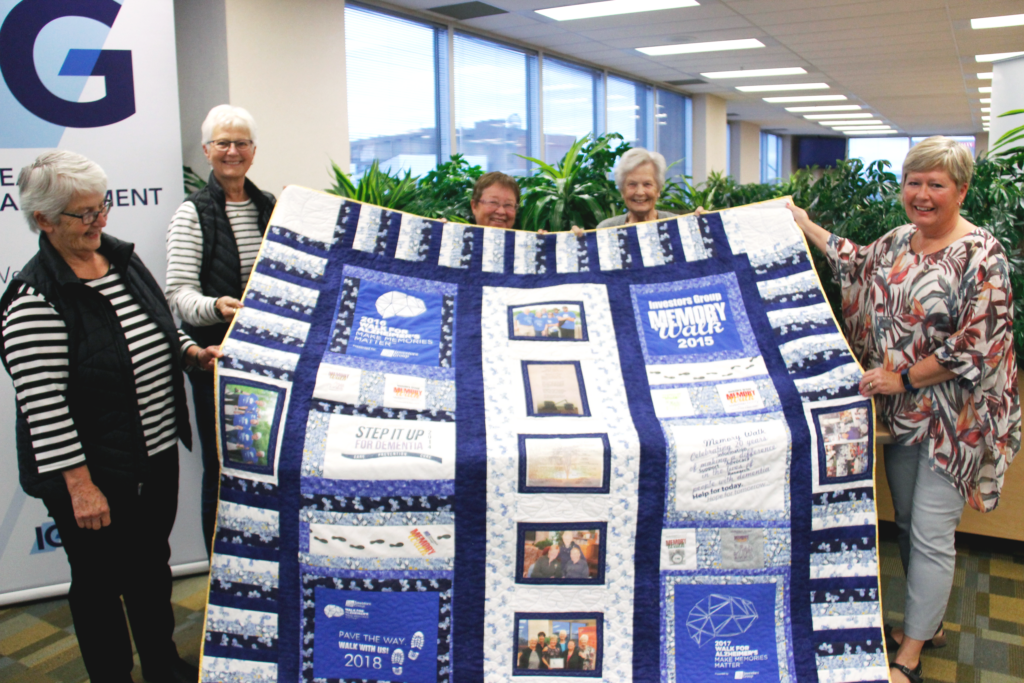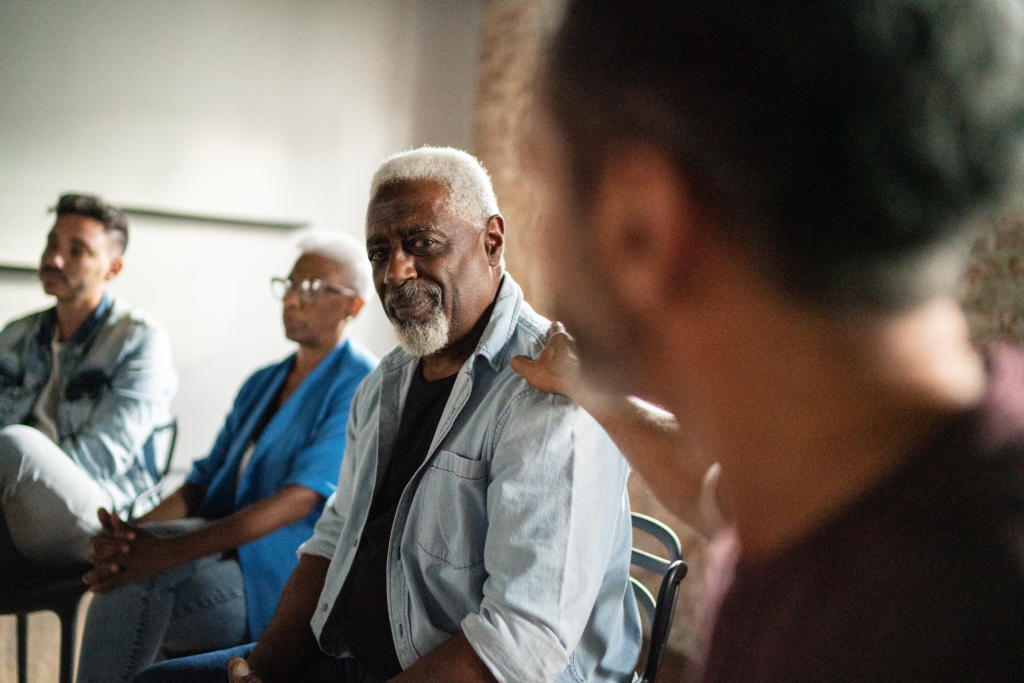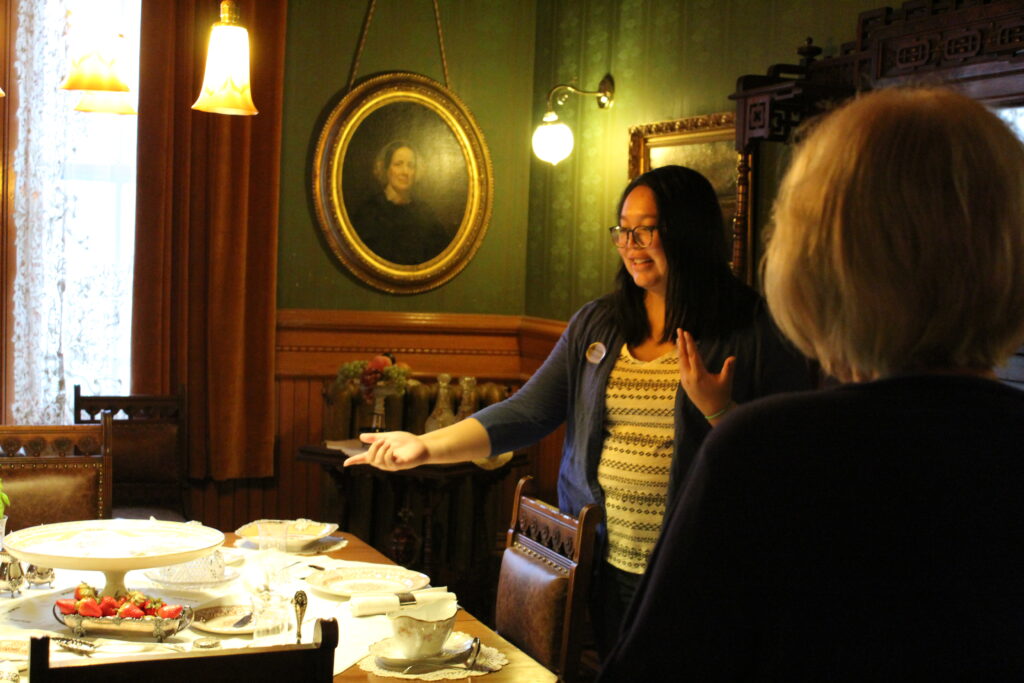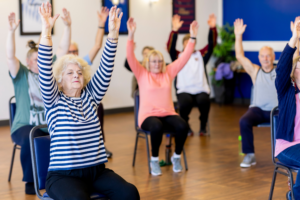Walk Your Way
Support & Education
2024 IG Wealth Management Walk for Alzheimer’s
Walk Your Way with us this May & June!
Can’t make it to one of our in-person Walks this year? That’s okay, there are many ways to get involved and Walk Your Way with the 2024 IG Wealth Management Walk for Alzheimer’s!
Here’s how you can Walk Your Way and join us in fundraising for people living with dementia across Manitoba.
- Track your steps and challenge your friends to match them.
- Post a challenge to social media and invite your friends to join you.
- Host a barbeque for friends and family and ask them to donate.
- Take your furry friend out on extra adventures!
You can also register for organized Walks taking place across the province in May and June:
- Winnipeg – Saturday, May 25 at 10 am
- Steinbach – Wednesday, May 29 at 5:30 pm
- Altona – Wednesday, June 5 at 10 am
- Brandon – Thursday, June 6 at 5:30 pm
- Selkirk – Thursday, June 13 at 5:30 pm
Check out the official Walk website for more details and to register. Then, start Walking Your Way!
Over 30 Years Walking for Dementia

Karen Braun (far right) along with members of Team Altona hold up Karen’s quilt that features her past walk t-shirts
This year marks the Alzheimer Society of Manitoba’s 40th anniversary and a long, rich history of dementia support across the province, including the IG Wealth Management Walk for Alzheimer’s.
Starting as the Memory Walk in 1993, the Walk is the Society’s largest annual fundraiser. It’s also a favourite way for many Manitobans to get out into the community to show support for people living with dementia, their care partners, families and friends.
Karen Braun has been supporting the Alzheimer Society for over 30 years, which became important for her after her grandmother, Susanna Friesen, passed away from Alzheimer’s disease in 1989. She joined Winkler’s first Memory Walk a few years later, and by 1996, her hometown of Altona established an annual Walk – she’s been walking ever since.
“I began participating in the Walk a few years after my grandmother passed away in her memory and as a tribute to her,” Karen says. “Now I walk for both her and my father, Abe, who passed away from vascular dementia in 2011. It’s a special way to honour them.”
For many years Karen has also won the Alzheimer Society’s Outstanding Volunteer Fundraiser award for her efforts in raising money for the Walk. She knows how far donations to Society go and that every little bit helps tremendously.
“Lots of people I know give regularly, but I do tap on a few new shoulders each year,” Karen says. “Even if they don’t donate, they’ll become aware of the Society.”
Raising awareness about dementia is just as important to Karen as raising funds. With dementia on the rise in the province, she feels it’s important to break apart the stereotypes and myths surrounding the disease.
“My family and I talk very openly about our experiences with dementia – we don’t feel like it’s something to hide,” she says. “Talking about it and raising more awareness in the community through events like the Walk is how we’re going to end the stigma.”
The Place to Turn for Dementia Support
Dementia has been a part of Sheila Anderson’s life for many years. She lost a grandparent to Alzheimer’s disease and had both a parent and sibling receive a dementia diagnosis.
Sheila was already aware of the Alzheimer Society by the time her husband Bruce was diagnosed with vascular dementia eight years ago.
“As soon as the doctor said those words to Bruce and me, I knew where we had to go,” Sheila says. “It’s always been an organization we’ve supported. After my dad passed, we couldn’t buy him birthday gifts anymore, so we donated to the Society instead.”
The Society connected Sheila and Bruce with helpful resources and information and gave them the opportunity to meet others living with dementia. When Bruce began attending a support group at the Winnipeg office, Sheila met with other care partners to chat over coffee.
“Being able to talk to people in the same position as you is so helpful because we all understand what dementia is really like,” Sheila says. “The Society is a place you know you can turn to for support.”
Sheila and Bruce are now regular monthly donors. Sheila says she learned about the benefits of monthly donations through her position as chair of her church’s financial committee.
“From a budget perspective, if you know what funds you have coming in monthly, it’s much easier to plan your programming,” says Sheila. “Although one-time gifts are always valued, consistency is so beneficial for community organizations.”
Donating to the Society helps to continue services like one-to-one counselling, support groups, education sessions, dementia-friendly programming and more.
“The number of people living with dementia is increasing, so there’s a necessity for resources,” Sheila says.
“You can make a huge difference by donating, and monthly gifts are a great way to contribute and give the Society your ongoing support.”
Ask an Expert: How to Sleep Better with Dementia
Question: The person I care for has trouble sleeping through the night. What can I do to help them get a better sleep?

Dr. Cary Brown FHEA, PhD, Professor, Department of Occupational Therapy, Faculty of Rehabilitation Medicine, University of Alberta
It’s common for people living with dementia to experience sleep problems. Reasons for this might be because they:
- Sleep more during the day and are awake and restless at night
- Are less active during the daytime so they are not sleepy at night
- Are unable to tell if it’s day or night
Insufficient sleep can lead to changes in behaviour. Care partners may also experience disrupted sleep if the person they’re caring for wakes up during the night, which can lead to them feeling burned out.
There are a few things you can try to help improve sleeping habits for someone living with dementia.
Typically, you want to encourage as much daytime activity and sunlight exposure as you can. Sunlight exposure helps our bodies know it’s time to be awake and active. People living with dementia may not be able to get outside as much as they used to, so light therapy lamps can be a useful tool.
Using a light therapy lamp for 20 minutes around breakfast and again around lunch provides the right amount of daylight exposure. In the evening, keep the lights dim, do calming activities and make sure the person living with dementia doesn’t go to bed too early.
If there’s one thing to focus on, it’s sticking to a bedtime routine. Transition objects can help signal to people living with dementia when it’s time for bed. These can be things like pajamas or a certain hand lotion. Working these objects into your nightly routine – for example, rubbing in hand lotion right before bed – helps the brain prepare for sleep.
Sleep problems can feel overwhelming and these strategies may not work for everyone. If you’re facing challenges around sleep habits, connect with the Alzheimer Society for guidance and further resources.
Join Dr. Cary Brown on June 11, from 2 – 3 pm via Zoom as she speaks more about the relationship between sleep and dementia in our Family Education: Next Steps series.
ADI ‘Attitudes Toward Dementia’ Global Survey
Alzheimer’s Disease International (ADI) has launched the 2024 Attitudes Towards Dementia global survey in partnership with The London School of Economics and Political Science, giving you the opportunity to join thousands of others and help us build the world’s largest international survey on prevailing attitudes and stigma towards dementia.
The survey is open to everyone, so please share it with your friends, family, colleagues, communities, and networks, and don’t forget to take part yourself!
Multiple languages are available, so select your language from the drop-down menu in the top right corner of the survey.
Access the survey today at 2024 World Alzheimer Report Survey: Your Attitudes Around Dementia
Join Our Spring Family Education Sessions
 Join us this spring and learn about a variety of topics from professionals, including understanding responsive behaviours, the relationship between sleep and dementia and more. These sessions are free to attend and offered via Zoom.
Join us this spring and learn about a variety of topics from professionals, including understanding responsive behaviours, the relationship between sleep and dementia and more. These sessions are free to attend and offered via Zoom.
Here’s what’s coming up:
Living with Dementia: First Steps
*Please note you do not need to attend the Living with Dementia series in order.*
Part 2
The second session of a three-part information series for people supporting someone recently diagnosed with dementia. In this session, learn about the legal and financial matters related to dementia.
Saturday, May 11 | 10 – 11:45 am
Click here to register.
Part 3
The third session of a three-part information series for people supporting someone recently diagnosed with dementia. This session is a WRHA Home Care Program & Services Overview.
Saturday, June 1 | 10 – 11:45 am
Click here to register.
Family Education: Next Steps
Understanding Responsive Behaviours
Responsive behaviours and reactive behaviours are terms commonly used to refer to actions, words or gestures presented by a person living with dementia as a way of responding to something negative, frustrating or confusing in their social and physical environment. This session introduces responsive behaviours while focusing on potential causes and triggers, as well as effective ways for care partners to respond.
Tuesday, May 21 | 2 -3 pm
Click here to register.
Sleep Matters: Understanding the Relationship Between Sleep & Dementia
In this session, important aspects about the relationship between sleep and dementia will be discussed. Participants will discover:
- how insufficient sleep increases the risk of falls and responsive behaviours in people living with dementia
- ways to identify features in the environment that contribute to poor sleep
- practical strategies to help improve sleep
Tuesday, June 11 | 2 – 3 pm
Click here to register.
Q & A with First Link® Client Support Staff
Do you have questions about dementia? Caregiving strategies? Communication tips? Join our First Link Client Support staff, who will provide a short presentation on some of the common questions received by the Client Support team about navigating the dementia journey. We will also leave time for attendees to ask other questions during an extended Q & A period.
Tuesday, June 25 | 10 – 11 am
Click here to register.
Family Education: Next Steps: You can choose to watch these online sessions in-person at the Alzheimer Society office (10-120 Donald Street, Winnipeg) – the speaker will not be presenting in-person. Please email [email protected] if you are interested in this option.
Family Education: Next Steps Sponsored by:
Visit the links below to view and register for more upcoming sessions.
Family Education | Spring 2024 Calendar PDF
Family Education | Upcoming Seminars
Find Encouragement & Understanding Through Support Groups
 If you’re living with or supporting someone living with dementia, our support groups are for you! Dementia can leave you feeling isolated, but you are not alone. There are others who share the experience of navigating dementia and we invite you to come meet them.
If you’re living with or supporting someone living with dementia, our support groups are for you! Dementia can leave you feeling isolated, but you are not alone. There are others who share the experience of navigating dementia and we invite you to come meet them.
When you join a support group, you connect with a community of people you can lean on for guidance, encouragement and understanding. You’ll also learn more about dementia and its progression, exchange practical coping strategies and mutual support and participate in meaningful discussions.
We offer groups for people living with dementia and for care partners both in-person across the province and virtually via Zoom. There are a variety of unique groups to choose from, so you can find the right fit for you.
Call us at 204-943-6622/1-800-378-6622 or email [email protected] and we can help you find the best support group to meet your needs.
For a complete listing of support groups, visit the links below:
Support Groups for Care Partners
Support Groups for People Living with Dementia
We welcome everyone to this inclusive environment for people of different ethnicities, cultures or persons who identify as part of the 2SLGBTQ+ community.
Register Now For These Upcoming Community Partner Programs
Participating in our community partner programs is a great way to get out and involved in the communtiy! The Alzheimer Society partners with community organizations to create programs designed especially for people living with early to moderate symptoms of dementia to attend with their family members, friends or care partners. Check out our Spring 2024 programs:
Dalnavert Museum Dementia-Friendly Tours
 Come to the Dalnavert Museum for their monthly dementia-friendly tours. This program allows people living with early to moderate symptoms of dementia and their care partners to step back in time and explore the historic house and its collection.
Come to the Dalnavert Museum for their monthly dementia-friendly tours. This program allows people living with early to moderate symptoms of dementia and their care partners to step back in time and explore the historic house and its collection.
After your tour of the museum, join them for tea and coffee and a closer look at some artifacts.
The next session is Saturday, May 25, from 10 – 11:30 am.
Please note: The upper floors of the museum are only accessible by stairs. If stairs pose a barrier, there will be the option of exploring the upper floors of the house with a tour guide in the Visitors’ Centre through our virtual tour. Folding cane-seats can be borrowed free of charge during your visit and there will be seating available throughout the museum.
Monthly Program
Dalnavert Museum, 61 Carlton St, Winnipeg
The last Saturday of every month, 10 – 11:30 am
Cost: $24.00 (plus tax) per pair and session, $12.00 per pair and session if one of the pair is a Dalnavert Museum Member
Register today on the Dalnavert Museum and Visitors’ Centre website.
Fun!-Damentals of Table Tennis (Manitoba Table Tennis Association)
 Introducing the Fun!-Damentals of Table Tennis program which connects people living with early to moderate signs of dementia and their care partners through fitness and friendship.
Introducing the Fun!-Damentals of Table Tennis program which connects people living with early to moderate signs of dementia and their care partners through fitness and friendship.
Table tennis is a great aerobic exercise with proven cognitive benefits. Participants will take part in gentle recreational play. We will teach basic techniques and rules of the game while having tons of fun.
The next session is Monday, May 13, from 6 – 8 pm.
Spring Program (10 weeks)
Cornerstone Alliance Church, 1100 Autumnwood Dr, Winnipeg
Monday evenings, 6 – 8 pm
April 8 – June 10, 2024
Cost: $110 per pair
Register today by emailing [email protected]
Minds in Motion® Spring Sessions
 Stay socially and physically active this spring with Minds in Motion®!
Stay socially and physically active this spring with Minds in Motion®!
Our popular Minds in Motion® program connects people living with early to moderate signs of dementia and their care partners through fitness, fun and friendship. Participants take part in a gentle chair fitness class followed by socially engaging activity and conversation. There are lots of laughs and social interaction during these sessions.
See below for locations still accepting registrations for Spring sessions:
Winnipeg Locations
Rady JCC Fitness Centre – 123 Doncaster St.
Wednesdays, 10 am – 12 pm
April 10 – May 29
NO SESSION ON APR 24
Call to register: 204-477-7510
YMCA – Elmwood-Kildonan – 454 Kimberly Ave.
Thursdays, 1:30 – 3:30 pm
April 11 – May 30
Call to register: 204-668-8140
Regional Locations
ALTONA
The Gardens on Tenth – 140 10 Ave. NE
Mondays, 1:30 – 3:30 pm
April 8 – May 27
Call to register: 1-204-324-8945
BRANDON
Seniors for Seniors – 311 Park Ave. East
Thursdays, 1:30 – 3:30 pm
April 4 – May 21
Call to register: 1-204-571-2050
PORTAGE LA PRAIRIE
Herman Prior Centre – 40 Royal Rd. North
Wednesdays, 1:30 – 3:30 pm
April 10 – May 29
Call to register: 1-204-857-6951
SELKIRK
Gordon Howard Centre – 384 Eveline St.
Wednesdays, 1 – 3 pm
April 3 – May 22
Call to register: 204-785-2092
To view a full list of all Minds in Motion sessions, visit our Minds in Motion webpage.
To inquire about future registration dates, please email [email protected].
NEW Minds in Motion® Evening Session Coming This June
We’re excited to share that our first-ever Minds in Motion evening session is starting this June! This will also be the very first session offered in summer – so fans of the program can continue to enjoy weekly fitness and fun throughout June and July.
This session kicks off on June 11 and will run every Tuesday from 6 – 8 pm until July 30. The after-work hours are perfect for those with busy daytime schedules and who can’t always attend our morning and afternoon programs.
See the details below and stay tuned for upcoming registration info!
Minds in Motion Summer Session:
Rady JCC Fitness Centre – 123 Doncaster St, Winnipeg
Tuesdays, 6 – 8 pm
June 11 – July 30
Registration info coming soon!
Annual General Meeting
Please join us as we celebrate a year of accomplishments at our Annual General Meeting.
Wednesday, June 19
Alzheimer Society – Provincial Office
10-120 Donald Street, Winnipeg, MB (Mezzanine Level)
5:30 pm
RSVP to Bonny Neal by Friday, June 14 at [email protected] or 204-943-6622.
Follow Us On Social Media
Join us on Facebook, Instagram, LinkedIn and X (formerly Twitter) for the most current news, information and resources. If you’re already following us on social media, invite your friends to do the same!
X (formerly Twitter)
We Rely on Your Donations to Continue Our Work

Your gifts are put to immediate use through our First Link Client Support team, support groups and education programs.
Remember. You Are Not Alone.
Are you struggling to figure out your next steps? Our First Link® Client Support team is here to listen and help guide you through difficult times – from when you are concerned about your own, a family member or a friend’s memory, right through to the later symptoms of dementia. Call us today at 204-943-6622 (Wpg) / 1-800-378-6622 (MB), email [email protected] or fill out our online form and we will reach out to you.




